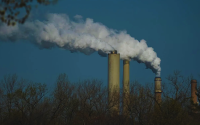That evidence can be found most dramatically in the high country's lack of snowpack.
Snow measuring sites monitored by the U.S. Natural Resources Conservation Service showed that 29 of 34 sites had no snow — the barest the survey sites have been going back to the earliest records in the late 1930s.
"Arizona is off the bottom of the charts," said Tom Pagano, a hydrologist for the service in Portland, Ore. "This year is unlike anything we've ever seen before."
A survey team scouting for snow this week in the San Francisco Peaks outside Flagstaff found just 4 inches where there should have been more than 50.
Snowpack is critical for Arizona's water supplies, feeding the streams and reservoirs that supply Phoenix, Flagstaff and dozens of other communities.
"We were all thinking that 2002 had been a once-in-a-lifetime event, that it would never happen again," Pagano said of what many scientists thought was the driest year ever. "So far, this year is worse than 2002."
Friday marked the 136th consecutive day without rain at Sky Harbor International Airport.
"We just never had a snowpack," said Larry Martinez, water supply specialist for the NRCS Phoenix office. "It just never developed."
Last year's wet winter did help the region's 11-year drought.
Dallas Reigle, a senior hydrologist for SRP, said that leftover moisture is all that stands between some areas of the state and immediate disaster.
"If we hadn't had a wet winter last year, we would be in so much trouble now in regard to water supply," he said. "I wouldn't even want to speculate."
The U.S. Forest Service imposed restrictions in four areas last month, the earliest the agency had ever taken such steps. And forest closures are possible by spring.
Jim deVos, research chief for the Arizona Game and Fish Department, said the drought is expected to take a heavy toll on wildlife as well.
"We're bracing for a tremendous year of hauling water," deVos said, "a repeat of 2002, with an exclamation point behind it."
Air quality has also been hurt by the lack of moisture. The Arizona Department of Environmental Quality has issued a stunning 24 high-pollution advisories since Nov. 1, and exceeded the federal standard for coarse particulates 29 times.
Last year, when storms drenched Arizona, the Phoenix area exceeded the standards twice, and the department issued no pollution advisories.
"We've never really seen anything like what we've gone through this season," said Steve Owens, the department's director.






